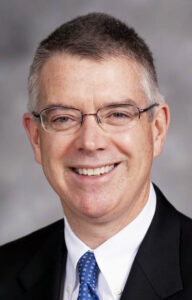By Tim Millea
Catholic Health Care Today

We all have places and services in our communities that are important to our neighbors and us. Our church, our school, our favorite restaurant. The blessings and benefits of places like these are evident to those who value them. Pharmacies often generate similar loyalty and familiarity, particularly for people who rely on them for their health care needs. Whether a pharmacy is freestanding or part of a larger store, it can earn the trust of its patrons with safe and reliable service. Unfortunately, that trust could be eroded and even destroyed by a recent Federal government announcement.
On Jan. 3, the FDA announced that retail pharmacies would be able to dispense mifepristone, the first of the two pills used in chemical abortions. (The second pill is already available at pharmacies.) If our neighborhood pharmacies were to do this, they would become true abortion clinics. Walgreens, CVS and Rite-Aid have already announced their plans to pursue dispensing mifepristone. Depending on state laws, this could include prescriptions for abortion pills delivered by mail, after being ordered online and without medical evaluation. The likelihood of great harm to pregnant women and girls is not debatable, as shown in reports in the medical literature. However, while a review of the medical harms is important, another factor reflects a major concern in health care today.
Suppose you are a pharmacist or pharmacy technician morally opposed to abortion. If you refuse to provide the abortion pill to someone with a prescription, you may lose your job or even your career. Pro-life pharmacists nationwide are worried and are reaching out to organizations such as the Catholic Medical Association for support and advice. These dedicated professionals are just a portion of a much larger community of faith-centered health care professionals who have been under assault over the past two years. Those threats have developed in the conflict between political ideology and constitutional rights.
The First Amendment of the Bill of Rights is clear about freedom of religion and the protection of “the free exercise thereof.” Over the past two years, the Federal government and many state governments have attempted to impose behaviors ethically opposed by many health care professionals. The proposals would not allow a physician, nurse, pharmacist or other care provider to decline to provide a treatment on moral, ethical or religious grounds. If these rules were imposed, those who refuse to comply would face discipline ranging from suspension to termination to loss of licensure, and thus, their livelihood.
The most recent and egregious effort was announced by the Department of Health and Human Services in early January. The title of the proposed rule seems encouraging: “Safeguarding the Rights of Conscience as Protected by Federal Statutes.” However, the text of the rule does not emphasize “protection.” The proposed rule essentially eliminates the existing rule that provides a clear process of investigation and enforcement for protection of conscience rights and religious freedom in medical careers.
If the proposed rule is finalized, what would be the impact on our communities? Physicians and others in hospitals and clinics ethically opposed to procedures such as abortion and gender transition surgery would be forced to make a choice: provide the treatment requested or face consequences similar to those that worry pharmacists now.
This would have a foreboding effect on the future of medicine as well because it could deter some young people from considering a medical career. They may choose other professions that do not threaten their religious beliefs or, if they do enter medicine, they likely would avoid specialties such as obstetrics and pediatrics where ethical practices are most endangered. The quality of care that our communities receive would be compromised. We would be left with health care that does not respect or recognize the dignity of each individual and her/his religious principles.
The First Amendment does not include a disclaimer that freedom of religion and conscience apply except in medical care. Each person who cares for others to the best of their ability and judgment has a right to follow their conscience. Only a small number of states have laws that protect health care professionals’ conscience. However, given the threats posed, many states now have legislation introduced to do just that.
Efforts are underway at the Iowa State Capitol to introduce a “conscience right protection in health care” bill this session. Without such protections, quality of ethical care that respects life as God intends would be threatened. If such legislation is passed and signed into law, we would feel confident that those who care for our communities and us can practice with the compassion and respect that results from conscience and faith-based principles.
(Dr. Tim Millea is president of the St. Thomas Aquinas Medical Guild and a member of St. Paul the Apostle Parish in Davenport.)











